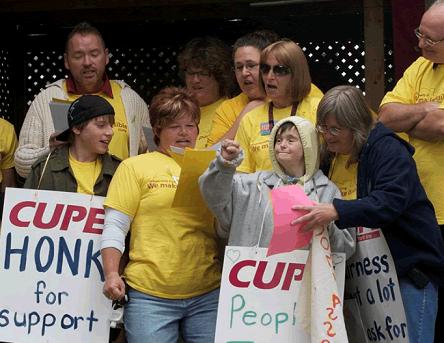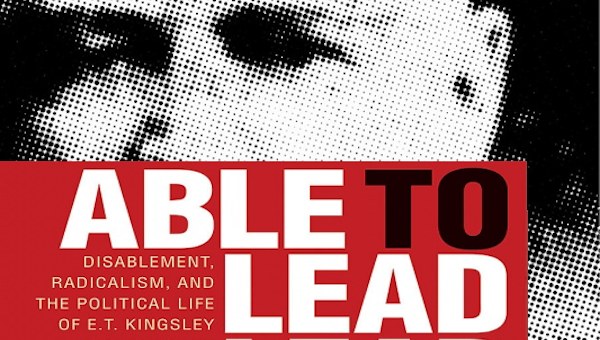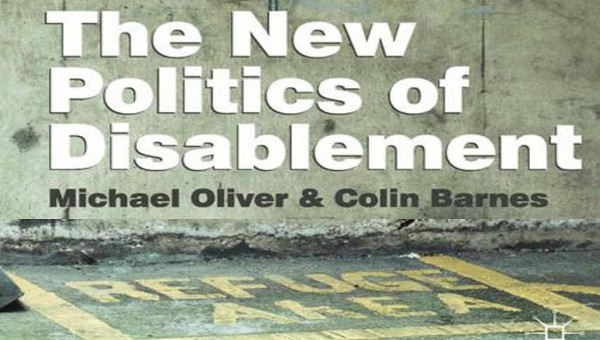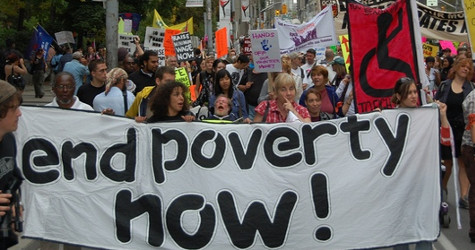Austerity, Disabilities and Union Rights: Opposing Bill 83
On the twenty-eighth of October, a bill passed Second Reading in the Ontario Legislature, a bill that is a clear danger to the labour movement’s ability to win fair contracts and defend public services. Bill 83 which essentially outlaws picketing outside of group homes housing people with intellectual and other disabilities that require home-care. Read carefully, the Bill would find not only individual picketers, but their unions liable for contravening this Bill. It was brought forward by Conservative MPP Sylvia Jones, and opposed by New Democrats Michael Prue and Peter Kormos. The Bill attempts to “strike a balance” between the rights of union members to take job actions, i.e. “freedom of communication and expression” and the rights of people with disabilities to have “peaceful enjoyment of their home, free from harm and threats of harm.” The Bill is now in committee and expected to appear for Third Reading.

On the face of it, this may seem to some people like a no-brainer. What kind of anti-social person, the Bill implies, would make disabled people feel unsafe? Indeed, even progressive Rabble columnist John Bonnar wrote uncritically about the Bill’s passage, taking a few representatives of the disabled at their words, even when these folks are connected with management.
What must be kept in mind is that any legislation that impacts the right of workers to take the type of collective actions that they see fit, chips away at the rights of all workers, unionized and non-unionized, not to mention, the rights of the disabled to receive top-quality services from well-trained, unionized, non-scab workers.
Indeed, as Kormos and Prue pointed out on the floor of the legislature, the types of actions that this Bill would criminalize would not exist if the province had anti-scab legislation, which would indeed strengthen the bargaining position of the low-paid and hard-working home care workers, and equally important, ensure that the recipients of home care would not have to deal with scabs with whom they have no ongoing relationship and rapport. Let it be stated clearly, the capitalist state has no legitimacy to make demands upon how the working-class struggles, period. Backing this kind of legislation, for progressives, out of some kind-heartedness, is akin to backing hate speech legislation, only to have it boomerang against Queers Against Israeli Apartheid.
Liberals in the U.S., as well, were happy to see Bill Clinton use maximal force against some cult members in Waco, Texas, but were shocked at the passage of the Patriot Act. We must be very careful, indeed, in granting the state any kind of legitimacy in regards to such matters. Even if one concedes, then, that it is unethical to run a picket-line by the home of someone with intellectual disabilities, one should see, with anti-union figures so prominent at all levels of government, that this is clearly a Trojan horse meant to knock over the already flimsy wall of Rand Formula labour protections.
Community Living Ontario and the Labour Movement
Much of the impetus behind Bill 83 came out of a job action undertaken by CUPE Local 1521-02 in the summer of 2009. Out of individual allegations in Lanark, Ontario, a group of family members and advocates formed organizations known as “People First” and “Respect Our Homes.” There is no reason to believe that these organizations were mere front groups: there was genuine concern among family members that their loved ones did not understand and/or were disturbed by their homes being picketed. Unfortunately, these organizations allowed themselves to be hosted and seemingly used by management, and representatives spoke glowingly about the “replacement workers.” While it seems likely that union leadership and members didn’t adequately prepare the service recipients to cope with the job action, it is also the case that the union local was fully prepared to engage with the community groups like “Respect Our Homes” only to be rebuffed.
If there are individual instances of workers harassing residents of group homes in the midst of industrial actions, this is a subject of concern. Those of us in and around the Left and the labour movement must not respond to this Bill by simply dismissing it. The disability advocacy movement itself is split on this issue, and emotions run high. There is no irresolvable antagonism between meeting the immediate needs of those who may well have legitimate concerns (whether these are based on truth or rumor), and/or have not been properly prepared to deal with the circumstances, and the workers who merely need to be able to send a message to scabs. Indeed when hiring scabs, Community Living Ontario is putting those with intellectual disabilities into highly dangerous situations. In 2009, while spending 500 per cent more for strikebreaking than they would have for their unionized staff, picketing workers who witnessed inappropriate behavior and restraining by scabs had to call police on these scabs more than once.1 Making it clear to groups like “People First” that it is highly unethical to allow scabs to care for disabled people should be first priority. “People First” counts deeply committed individuals among its rank and file and a firm commitment to defending the funding of public services. It is puzzling that “People First” is in favour of allowing those with disabilities to be cared for by scabs.
As disability activist and former chief steward of CUPE Local 3903 Chelsea Flook said in an interview, “rank and file workers should work with impacted communities and to challenge management’s ability to speak on behalf of disabled people when it’s the frontline workers who have relationships with the service recipients.” Flook also wonders who actually wrote the bill: “If it’s not coming from people with disabilities, contravenes the spirit and intention of the AODA (Accessibility for Ontarians with Disabilities Act) – nothing about us without us.” It seems doubtful that those with intellectual disabilities put together this bill, or even were consulted.
Indeed, this is the context in which this Bill must be seen – as a division between liberals directing social agencies (who lack a class-analysis) allied with anti-union conservatives, on the one hand, and frontline workers, facing difficult work conditions and threats of replacement by scabs, on the other. What is a bigger threat, indeed to the well being of those with disabilities – a couple of isolated picketline actions that can be dealt with under existing laws? Or having those with disabilities cared for by underpaid and less-skilled scab workers, part of the growing reserve army of labour who are desperate for work in a time of capitalist crisis and a new round of austerity measures.
Public Sector Workers, Users and Community Fight-backs
It has become increasingly apparent that the greatest barrier to building a united community fight-back against the “new fiscal austerity” measures is the lack of a strategy and institutionalized connections – and a movement building these links – between public sector workers and public service recipients. At a press conference, a spokesperson for community-living claimed that a disabled person didn’t feel safe showing up to give his point of view. But, as Flook notes, the issue is one of who has the right to represent and advocate for them, and the rights of workers to legitimately undertake collective action.
Time and time again, senior public sector management and the bourgeois media invoke the issue of workers holding the public “hostage.” This was the phrase used by a Conservative Party “astro-turf” operation against, for example, CUPE Local 3903 striking against York University in the winter of 2008/2009.2 This has generated a number of cases of legislation that sent public sector workers, such as Toronto Transit workers, CUPE 3903, back to work. We seem to be in a further phase of what Leo Panitch and Donald Swartz called “permanent exceptionalism” in the undermining of public sector bargaining rights – a key feature of neoliberalism.3 The raising of public discontent and suggestion of privatization during the city-workers strike in Toronto, not to mention smaller occurrences as in the case with the Ontario driving instructors, we are currently seeing a sharp attack on public-services, from governments of all political stripes at all levels. This is a particular “class-war from above” strategy, to divide public sector workers from the users of public services while pursuing further privatization, commercialization, contracting-out and cuts to the levels of provision.
The new austerity agenda hits all marginalized and working-class people, including those who are not able-bodied enough to be a part of the workforce. Most home care workers work just above the poverty line, and by all accounts are some of the hardest working and dedicated people one could possibly know. These are people who have intentionally pursued “care-work.” But they also want to ensure job security, a living wage and safe work conditions.
There are ways in which the issues brought out in Bill 83 can be addressed without impacting the legal rights of labour. This can include negotiating a picket-line protocol that would see union locals, for example, engaging in more creative forms of struggle beyond the necessary but limited “walking-in-a-circle” picketing.4 If scabs are working in group-homes, it is the elementary responsibility of workers to oppose this, but this can be done in more creative and effective ways to ensure care is still being provided. As Flook contends, “if a union organized with the people for whom their job is to serve, and asked what they need in order to support different job actions by their support staff, it could be negotiated…that way, the mainstream media has a much harder time trumping up the community as victims since they were active participants in the job action strategy.”
How can this be done? A start would be for labour organizers to make contacts and develop concrete relationships with advocacy groups, from the mainstream, such as People First, to the radical, such as Damn 2025 and MAD Pride, to discuss both the importance of workplace safety and fair pay for home-care workers. Broad social justice campaigning and specific campaigning around issues of ability and accessibility are not at all contradictory. This can be seen in any number of campaigns, such as in the Greater Toronto Workers’ Assembly’s Free and Accessible Transit Campaign, bringing together multiple activists from different traditions. A new Left in the labour movement that can address community concerns is another necessity.
There is a need for a space in which these issues of building concrete links between public service providers and recipients, to defend and expand the public sphere, can be discussed and built – a yawning gap in the Canadian labour movement today. Most importantly, the labour Left must realize that we must not cede to neoliberal advocacy-style politics on contentious issues like this. Making it clear that scabs are hazardous to the health of those with disabilities, and developing ongoing personal and organic relationships between the users and providers of public services, should be an essential strategy in the coming battles against austerity. •
An earlier version of this article appeared at www.rabble.ca.
Endnotes
- CUPE Ontario Press Release, August 20, 2009.
- The organization was known as “York Not Hostage.” It was supported openly by the University administration. “Astroturf” should be understood in contrast with “grassroots”: an astro-turf operation is a fake grassroots operation backed by powerful vested interests – i.e. the Tea Party in the U.S., anti-indigenous racists backed by developers, etc.
- Leo Panitch and Donald Swartz, From Consent to Coercion: The Assault on Trade Union Freedoms, Toronto: Garamond 2008.
- “The Class Struggle in Vaughan,” The Bullet No. 409.





